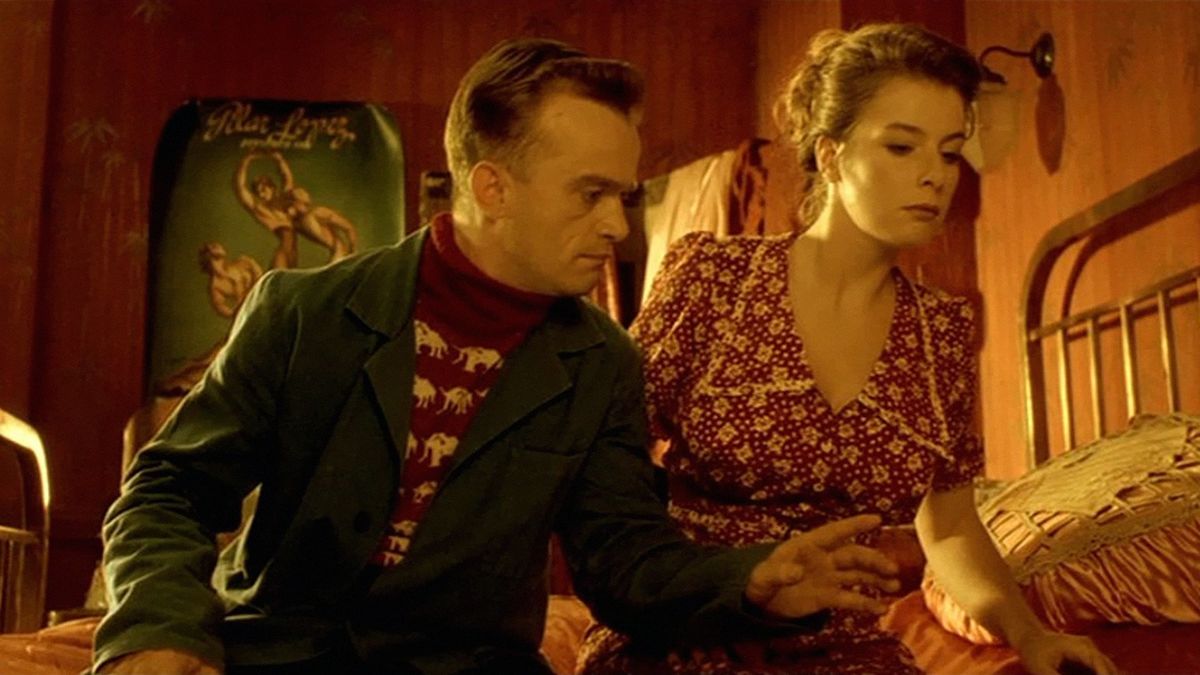Delicatessen Film Review
By Michelle Strozykowski

Delicatessen, the breakthrough movie from directors Jean-Pierre Jeunet and Marc Caro, takes a satirical sideswipe at a dystopian future full of oddball characters.
Un Film de Jeunet et Caro
The 1991 French film Delicatessen was the feature length debut of directors Jean-Pierre Jeunet and Marc Caro. The phrase 'un film de Jeunet et Caro' has since become a fore-token of twisted fairytale narratives, dark humour and sumptuously realised visual effects.
The Story
Delicatessen is set in a ramshackle post apocalyptic world where food has become a scarce commodity. The gruesome butcher Clapet (Jean-Claude Dreyfuss) has begun to look elsewhere for his supply of meat. The butcher is also landlord to an apartment block (his delicatessen occupies the ground floor). He supplies his starving tenants with just enough meat to sustain them, whilst subduing them with his fiery temper and the fear that troublemakers will find themselves under his cleaver.
Dominique Pinon plays Louison, a former circus entertainer who takes a job as handyman for the apartment block. Much to Clapet's chagrin, Louison begins to fall in love with Julie, the butcher's sweet, kooky daughter. Julie is not at all like her monstrous father, and refuses the packages of meat he sends her. When his psychopathic behaviour threatens her burgeoning relationship with Louison, it is Julie who takes a stand by making contact with the troglodytes. The troglodytes are a strange band of vegetarian rebels who live underground. They agree to help Julie in return for sacks of grain.
The Look and Feel of the Film
Delicatessen features a myriad of weird and wonderful characters, with many of the most joyous aspects of the film coming from brief glimpses into the lives of the minor characters. There are two little rascals who spy on an old man who surrounds himself with frogs and snails, and Aurore the haughty, uptight woman on the continual brink of failed suicide attempts. The world these quirky characters inhabit is rich in detail and filmed in beautiful tones of red, green and brown to give a worn out, weather-beaten feel to the futuristic world.
One of the most famous scenes was also the sequence used as the film's trailer. The butcher is making love to his mistress on a squeaky bed. As the noise of the springs gets faster, the camera swoops around the apartment block observing all the tenants getting on with their own work in time to the rhythm of the bed springs. This clever, funny sequence has been replicated many times, especially in TV advertising, but it's never been bettered.
Critical Response
Delicatessen walks the fine line between art house cinema and mainstream success, achieving that rarefied phenomenon of satisfying both. The film was very well received by critics and audiences alike, winning several awards and nominations. The favourable response meant the hotshot crew were all suddenly very much in demand. Indeed, Darius Khondji's beautiful cinematography has since seen him put to work on some very big Hollywood productions such as Seven, Stealing Beauty and Panic Room. Nevertheless, everyone re-united to make Jeunet and Caro's next film The City of Lost Children.
The unique and refreshing vision of Delicatessen is completely deserving of all the accolades. The film's hermetically sealed world is undeniably grotesque and squalid, but it's shot through with humour and romanticism, making Delicatessen one of the most unconventional love stories ever told.